


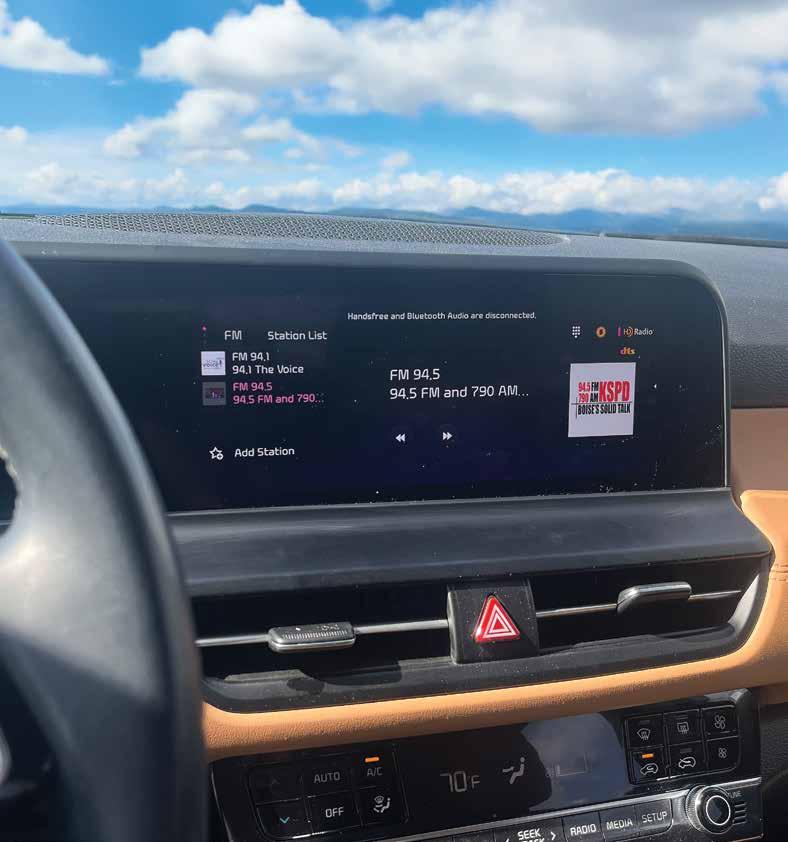














Thornton Part 1: Pastor
PUBLISHER
Sandy Jones • 208-703-7860 christianlivingmag@gmail.com
EDITOR
Gaye Bunderson editorgaye@gmail.com
Submit story ideas, article submissions & press releases
GENERAL INFO christianlivingmag@gmail.com 208-703-7860
ADVERTISING & SALES
Kimberly McMullen • 208-703-7509 kim.bcliving@gmail.com
GRAPHIC DESIGN
Denice King • 208-918-5190 www.greentreedkdesign.com

Kenna Harbison, Photography GA, Boise State University Department of Athletics
CONTRIBUTORS
Larry Banta, Steve Bertel, Daniel Bobinski, Rick Chromey, Tom Claycomb III, Roxanne Drury, Doug Hansen, Gary Moore, Mark Naito, Matt Sieger, and Janet Thompson
Idaho


By Sandy Jones
Many of our readers know Christian Living was an idea God gave me when I was working for another publisher way back in 2012. At that point in time I thought it was just part of my j-o-b.
It took us 13 months to hit the stands with our first issue in July 2013. We were so excited. All the hours of talking to study groups, friends and family, not to mention other publishers of similar magazines, along with lots of research and development, had gotten us to this point. (Thankfully God sent us our wonderful editor, Gaye Bunderson, in the middle of all of this – we clearly had no clue what we were doing, and she came in and saved the day!)
Long story short, I got ill and had to leave that job, and in doing so my hubby and I bought Christian Living Magazine. God had not only planted the seed, but He’d given me the passion for it! (By the way, today we are a 501(c)(3) non-profit – nobody owns a non-profit – it’s ALL God’s now.)

We had a solid plan, but as more and more issues came out, our readers, people just like you, started reaching out and sharing the things they liked about the stories and articles – explaining how we were feeding their souls, and impacting their lives!
I’m a simple woman, often simple-minded, but it didn’t take long to realize this was not just a magazine, but a full-blown ministry. Although I’m no Bible scholar, it seemed that God had been equipping me for this for many years. Classes I took. Bible studies I attended, or led, and the hours of prep work that went into them. Until one day fairly early on I realized that this wasn’t my j-o-b, it’s my calling. I’m not implying that I’m special, because I’m not. In looking back at the chapters in my life over the last 29 years, I’ve been reflecting on church leadership roles that I was reluctant to take on (you should ask my pastor about some of the debates we’ve had over that – boy is he a patient man!); topics our small group wanted to tackle that I knew nothing about; Christian Living itself – I say often if I had known in 2012 what I know today I would have run away screaming; our radio show, Christian Living Spotlight* – oh my goodness, I told God for a year-and-a-half nobody wanted to hear my voice on their radio, and I’d ask, “What do I have to offer of any

value anyway?” – no spiritual warfare there! But as I look back over these years and seasons I’ve come to realize that none of these were my j-o-b, nor were they hobbies; they were all things God was calling me to do. Yes, each of them “a calling”!
Today our “staff” (a team of independent contractors who take their work on CLM very seriously) all agree and feel that this is something God has called each of us to do. We are dedicated to making it happen each and every week, every issue, every time! So may I ask you – what is God calling you to do? Is he asking you to teach Sunday School? Be in the choir? Sit on your church’s Board of Trustees? Or simply check in on your neighbor? What if each of these things isn’t just a task but an honest-to-goodness something God is calling you to do?
Col. 3:23 sums up how we should look at a calling (quoting the NIV here): Whatever you do, work at it with all your heart, as working for the Lord, not for human masters.
I’ve learned too that sometimes the enemy distracts us. Makes our “work” tedious. Our “co-workers” trying. Tempts us to be “lazy” – after all it’s just volunteer work. Or even worse, sometimes the enemy teases us with pure headiness – self-important ego if you will – but it’s none of this. It’s actually a calling from our God, the Lord Most High! If we’re being honest with ourselves, AND with God, it should be done “as working for the Lord” because it is. So again – may I ask? What is God calling YOU to do?
Until next time… God Bless!




WE’RE MOVING! Beginning September 6th

You’ll find Christian Living Spotlight Saturdays at Noon MST on 94.5 FM KSPD - Boise’s Solid Talk station! Listen “live” at www.790kspd.com or Subscribe & Listen on your favorite streaming service! Informative, Entertaining & Inspiring Listen “Live” or as a Podcast!

A NOTE OF GRATITUDE: If I might take a moment to thank everyone who reached out after my last column. Sympathy was never my intent, although my husband, Steve, and I continue to covet your prayers as his cancer journey continues on. We are cautious to remember that the Almighty God is still on the throne, and He has a plan; keeping in mind that His ways are not our ways, and His Will might be different than our desires, we give it all to Him and Him Alone. From the bottom of our hearts – thank you! Also, may I ask you to please frequent our advertisers? While our team works diligently to put this wonderful magazine together, nothing any of us do matters if we can’t get it printed and out to you. Our wonderful advertisers make that possible. When visiting their stores or offices, please thank them for the important role they play by their support of Christian Living Magazine. n
*Starting September 6, Spotlight will be airing on 94.5 FM KSPD at noon MST on Saturdays, while continuing to be available as a podcast on your favorite streaming service.

Two programs under the umbrella of Launch Ministries serve teens in two different ways.
One branch of the ministry is called Launch Pad. This program offers high school students at almost every high school in the Treasure Valley the opportunity to take Christian Release Time classes during their public-school day.
“It’s a great place to grow in your faith and community,” Kristin Brown, in charge of Program Development and Administration for Launch Ministries, said, “Talk to your school counselor today to add Launch Pad to your schedule. Visit launchministries.org for more information.”
The other branch of the ministry is Launch Gap Year. Brown explained: “If you or someone you know is a graduating senior, consider attending Launch Gap Year as your next step. We’re an 8-month gap year program for students who want to be lifelong disciples of Jesus and who love Him and others with all their heart, mind, soul, and strength. And you can earn college credit. Visit launchgap.org for more information.”
A few students who have participated in one or both programs had the following to say about them:
• “I get to have Christian fellowship at a non-Christian school.” – Kyler, LP student
• “LGY has made such an amazing impact in my life! I’ve made new friends and I have grown so much in knowledge of God through my Bible classes, which has grown my faith immensely.” – Audrey, LGY student
• “I enjoy talking and learning about God with people I trust.” – Keona, LP student n



By Daniel Bobinski
Recently I stumbled across something that changed my understanding of what Jesus meant when He said, “Enter by the narrow gate; for wide is the gate and broad is the way that leads to destruction, and there are many who go in by it. Because narrow is the gate and difficult is the way which leads to life, and there are few who find it” (Matthew 7:13-14 NKJV).
What caught my eye was the way to eternal life being described as “difficult.” The NASB uses the word “constricted.”
For the gate is narrow and the way is constricted that leads to life, and there are few who find it.
The Greek word translated “narrow” (stenos) means more than skinny. It means a tight pathway that’s hard to navigate. And the word for “difficult” or “constricted” (thlibo) means to be afflicted, to suffer tribulation, to be troubled or pressed on every side. In other words, Jesus is describing a difficult-to-navigate, challenging road.

How many people have been told that accepting Jesus into their life means smooth sailing, answered prayers, and financial blessings? Many subscribe to the feel-good theology that God wants us all to be comfortable. In fact, recently I heard someone say, “Forget all the thee and thou’s — God just wants us to be happy.”
Sorry, but the Bible does not teach that. Happiness is fleeting. It’s often tied to self-centered goals or even moral compromise instead of God’s clear desire for us to pursue holiness, obedience, and sacrificial love. Don’t misunderstand, God delights in blessing His people with good gifts, but His ultimate purpose for us is our transformation into the likeness of Christ — and with it comes joy! In fact, God says in His presence is fullness of joy! Joy is a deeper, enduring state, and it’s rooted in our unity with God, despite any suffering or difficulty we face.
To help us understand how God uses tribulation in our lives to bring about blessings, let’s look at some examples from God’s Word.
In Genesis 37, Joseph was his father’s favored son, with dreams of greatness. But his own brothers threw him into a pit and sold him into slavery. Over the next 13 years, Joseph was a servant and also a falsely

accused prisoner. Surely Joseph was not happy with those years, but every trial he endured prepared him to be the Prime Minister of Egypt and save his family from famine.
Then there’s David. Samuel anointed him as king but then he spent 15 years running from Saul and hiding in caves. No doubt that during those wilderness years, David was not happy about his situation, yet he was learning exactly what he would need to lead Israel into its golden age.
Let’s also consider Moses. He spent 40 years in Pharaoh’s court, then 40 years as a lowly shepherd in the wilderness before God called him to lead the Israelites out of Egypt in a mighty way.
Recently I came across a “conversation with God” produced by the Therismos Foundation. Here’s an adapted version:
I asked God, “Why did they leave me like I was nothing to them?”
God answered: “Judas walked with Jesus. He ate with Him and laughed with Him. And yet he still betrayed Him.”
I paused.
God continued: “Not everyone who walks beside you is truly with you.”
I then asked, “But why let me love them so deeply if they were going to break my heart?”
God said, “Because love is never wasted. What you gave reflected me. I am love. Even when they didn’t stay, you did what was right.”
I said, “But my heart hurts so very deeply. Why have I been so forgotten?”
God replied, “Joseph was left in a pit. Then he was sold, and eventually thrown into prison. But he was never forgotten. I was right there with him, writing a greater story. Just because they abandoned you doesn’t mean that I have abandoned you.”
Through pain, I asked, “Will I ever be enough for someone to stay?”
God said, “You were already enough for Me to die for. The one who stays will be someone who sees you through MY eyes, not through their wounds.”






I sighed. “Then what do I do with this pain?”
God said, “Lay it down. Even Jesus wept when Lazarus died, but He still moved forward.”
God continued: “Your heart is allowed to break -- but don’t let it stay broken.”
Then, with tears in my eyes, I asked, “Will anyone here ever love me like I love them?”
God said, “Yes, but not without you letting ME love you first. Let ME be the one who heals what they could not hold.”
Finally, I whispered, “So You’re going to be here?”
And God said, “I never left. I was there when they walked away. And I’ll be here when you rise again.”
This hypothetical conversation brought tears to my eyes. It reminded me that God sees the end from the beginning. He knows what we need to become who He’s called us to be, sometimes stripping away what we thought we needed and putting us through difficult times so He can give us what we actually need -- for His glory and for our joy.
In closing, remember Hebrews 12:2, which says, “Looking unto Jesus, the author and finisher of our faith; who for the joy that was set before him endured the cross, despising the shame, and is set down at the right hand of the throne of God.”
We know Jesus wasn’t eager for the cross; He asked three times if another way was possible. But for the joy set before Him, He endured the pain. And because He did, we have the blessing of eternal life with Him forever.
So yes -- endure your struggles. God has blessings beyond measure for you on the other side. n
The City of Caldwell boasts a population of 56,541 people within its city limits. Its major employers include the College of Idaho, Simplot, and West Valley Medical Center. Sunnyslope Wine country, Indian Creek Plaza, and the AgVenture Trail are some of the municipality’s tourist attractions. Boise River is located at the north end of town, and the community also borders the Deer Flat National Wildlife Refuge, which encompasses Lake Lowell, a 14.5-square-mile reservoir that is a site for boating, fishing and wildlife viewing.
Thanks to organizer Arlene Robinett, two prayer events are also annually held in town – one in spring and one in fall. Walkers fill the city with prayers.
The Fall Caldwell Prayer Walk is set for Saturday, October 18, at 3 p.m., starting at Caldwell Memorial Park.
“We walk around downtown, praying at the gazebo, the police station, city hall, the fire station and then back to the park for a potluck,” Robinett said. “We pray for all people in all walks of life, including students, employers, public servants, and many others. All are invited to come. We have a great time of being together and praying for our wonderful city.”
Roughly 45-50 people participate in the walks, and Robinett offered examples of prayers she believes have been answered.
“I’m excited for Young Life coming to Caldwell sometime soon,” she said. “It is for middle schoolers through college students. I just found out! Praise God for an answer to prayer, as we’ve been praying for all people to come to know Jesus in their lives.”
She continued: “Caldwell has five Child Evangelism Fellowships in one middle school and four elementary schools. It has a Boys and Girls Club also. All great things for the young people, praise God!” n
For more information, call or text Robinett at at (208) 391-8516. (Facts about Caldwell taken from www.cityofcaldwell.org and www.destinationcaldwell.com.)

By Janet Thompson
In July, we celebrated America’s Independence Day. While I could write an entire post on the importance of remembering that we’re always in a spiritual battle to maintain our religious freedoms and independence, I want to focus on how personal independence affects our bodies and our health.
Once we move through our teens into adulthood, we usually have freedom to determine what we eat, when we eat it, and how much we eat. I remember leaving home and my mother’s cooking to attend college. Staying in the dorms came with an all-youcan-eat meal pass in the cafeteria! After growing up with my mom carefully portioning food on our plates and determining what we ate, it was amazing and a little overwhelming to have so many food choices and freedom to eat whatever I wanted. Some foods they offered I’d never even tried before. Since I was getting a degree in Dietetics, I made wise choices (for the most part), but let’s just say it’s a good thing I didn’t have a car and had to do a lot of walking around campus.

Often people’s resistance to eating healthy is that it’s their body and they’ll do what they want with it, whether it’s unhealthy eating and drinking, or even drugs, and cigarettes. But thinking of our bodies as our own is a false statement fed and fueled by Satan, the father of lies, who can’t create anything but deterioration, destruction, and decay.
God created every person. No one created himself or herself, and no one comes into being except through God. Every person has to admit he or she was created by something even if they don’t believe the Scriptures that affirm it was God. I wonder who or what they think gave them life?
“So God created mankind in his own image, in the image of God he created them; male and female he created them.” — Genesis 1:27
“For you created my inmost being; you knit me together in my mother’s womb.” — Psalm 139:13
God does care about what we do with the body He gave each of us. It’s not our body, it’s His. We aren’t supposed to treat our Godgiven body as if it’s worthless to anyone but us. When you think of the intricate workings of our body that sustains life, it’s almost more than our mind can conceive. I’m sure every doctor who studies the body reveres the body’s intricacies. It’s hard to imagine any doctor not being a believer!
God does care how we treat His intricate temple that comprises our body, soul, and spirit.
“Do you not know that your bodies are temples of the Holy Spirit, who is in you, whom you have received from God? You are not your own; you were bought at a price. Therefore honor God with your bodies.” — 1 Corinthians 6:10-20

“God cares so much about your body that He even knows the hairs on your head, and those that fall out. And even the very hairs of your head are all numbered.” — Matthew 10:30
Now it’s true that God isn’t going to love us any more or less based on how we treat our body, and He has given us free will. When He created man and woman, He said that it was good. He was pleased with His creation. Before the fall, I have to believe that the Garden of Eden was full of fabulous food. Adam and Eve had the freedom to eat whatever they wanted except from the forbidden Tree of the Knowledge of Good and Evil. God gave them the choice to obey Him or disobey Him.
Everything Adam and Eve were allowed to eat would’ve been naturally delicious and full of nourishment to keep them healthy. They probably didn’t have to worry about their weight and got plenty of exercise walking around the garden.
We know what happened though when they gave into Satan’s temptation by eating what they weren’t supposed to eat and God cast them out of the garden. They had to start finding and making their own food choices just as we do.
One last point I want to make is that some people can eat whatever they want without any problems of weight or health issues. If that’s you, savor that freedom, but don’t boast about it because not everyone is like you. Be considerate, especially at parties, barbeques, holiday celebrations, rafting on the beautiful Idaho rivers or camping in the mountains with friends and family.
Here’s a few reminders if you’re hosting or providing the food at an event.
1. Maybe you can eat steak and hamburgers, but someone else is trying to lower red meat intake because of high cholesterol or other health or dietary restrictions. Don’t make them feel uncomfortable. Offer an alternate choice. Alternatively, if that happens to be you, let your host know in advance or provide something you can eat.
2. Maybe you’re a meat lover, but someone else is vegetarian. Have a variety of veggies, salads, and non-meat items available.
3. Maybe you can eat desserts with no concern for weight gain, but someone else is trying to lose weight, is diabetic, or eating sugar-free. Don’t tempt them with gooey concoctions that will only make them feel guilty later or maybe seriously hurt their health. Add fruit and light cheese to your dessert menu.
4. Maybe you can drink a glass of wine or have a beer, but someone else doesn’t drink, can’t tolerate alcohol without getting drunk, or is a recovering or still an alcoholic. More accidents happen from drinking and driving, especially on holiday weekends. There are many non-alcoholic alternatives and parties really are more fun when everyone has their faculties about them and is coherent.

Here’s the bottom line:
“It’s true that we can’t win God’s approval by what we eat. We don’t lose anything if we don’t eat it, and we don’t gain anything if we do. But you must be careful so that your freedom does not cause others with a weaker conscience to stumble.” — 1 Corinthians 8:8-9 NLT
“You, my brothers and sisters, were called to be free. But do not use your freedom to indulge the flesh; rather, serve one another humbly in love. For the entire law is fulfilled in keeping this one command: ‘Love your neighbor as yourself’.” — Galatians 5:13-14 n
Janet Thompson, award-winning Christian speaker, freelance author, and author of 20 books, is also the founder, director, and God’s servant of Woman to Woman Mentoring Ministry and About His Work Ministries. Her passion and focus is mentoring the next generation. Her tag line is, “Sharing Life Experiences and God’s Faithfulness.” She has a BS in Food Administration, MBA, and Master of Arts in Christian Leadership. Check out her books and sign up for her free weekly online blog and monthly newsletter at womantowomanmentoring.com. Join her on www.facebook.com/Janetthompson. authorspeaker, LinkedIn, Pinterest, X, and Instagram.
4 -6 pork chops
2 Tbsp. avocado oil or olive oil
8 oz. sliced mushrooms
3 minced garlic cloves
½ cup heavy cream*
½ cup grated parmesan cheese
1 tsp. oregano
Salt to taste
Pinch of red pepper flakes
3 cups spinach

Image by www.eatwell101.com
Season chops with salt and pepper and cook in oil until browned on both sides, then remove and cover with foil to keep warm. In the same skillet, cook the garlic and mushrooms until tender. Add the cream, parmesan, oregano, salt, and red pepper flakes. Stir to combine well. Then add spinach and continuing stirring until wilted. Return the chops and any juice on the plate back to the frying pan. Cover and cook for 5-10 minutes until everything is warm. You can serve as is or over steamed rice or riced cauliflower. Enjoy!
*Check the label on heavy or whipping cream to be sure there are not additives or preservatives. So far the only brand I’ve found that’s additive-free is at Trader Joe’s.
Give
#1 in
a
fi
(That’s
)







From big to small, rustic to modern... Choose from 300 tables, 8 woods, & 40 stains.








By Tom Claycomb III
You’d think it’d be an easy gig to write for a magazine that only has a due date once every two months but not so if you’re an outdoor writer in Idaho. There’s so much to do here that you could easily write two per week and some weeks more if you had time. The problem is selecting which of the 2,000,000 topics to write about!
This issue let’s briefly cover backpacking. If you’ve never backpacked, you’ve gotta try it. Some people are intimidated because they hear of people doing 25-50 mile hikes. You don’t have to go that far; in fact, I’d suggest that you only go one mile on your first trip so you can test out your gear, see what works/doesn’t work and what else you need. Decide why you’re going. I do it to get in the backcountry to hunt or fish.
I teach a lot of outdoor seminars around the country. I always talk for 45 minutes and then answer questions for 15 minutes, but in my backpacking seminars they always want me to talk for 15 minutes and then show them what gear they’ll need. So, let’s go over the basic items needed for backpacking.
Backpackers have two enemies:
1. Bulk
2. Weight
I splurge a little on weight on my tents. I like the little dome tents. That way I have a little room and can keep a few items in the tent. The really small tents make me feel like a bear taco! I take a lighter sleeping bag and wear base layers to stay warm. There’s a lot of inflatable sleeping pads now. Take a 5x7 tarp to lay on the inside of your tent.
I like a powerful flashlight in case of a bear encounter; a dinky one to read by; and a headlamp. I just found some lightweight solar charged lights from SOLIGHT that I’m about to test.
You’ll want a filtered water bottle. Also, a small coffee pot to heat river water for your coffee, dried meals, and oatmeal. Motel coffee packs work great for carrying coffee. I carry backpacking forks/ spoons and of course 1-2 knives. A backpacking chair is a luxury instead of sitting on the dirt.
Meals: Flavored oatmeal for breakfast (with wild huckleberries in season); peanut butter sandwiches and Cheetos for lunch; and then I splurge and eat a nice backpacking meal for dinner. You’ll be burning a lot of energy so I take some candy. Can anyone please find me some Zero candy bars? And if my daughter goes, we’ve got to take S’mores.
You can go all out and buy expensive cookware OR… pick up items at Goodwill/garage sales. You’ll want a plastic coffee cup and an Army kit/Boy Scout mess kit to cook and eat out of. Maybe a plastic plate. I take a half roll of paper towels for TP, cleaning dishes, and taking a freezing river bath.
Fire gear: Take waterproof matches and 2-3 Bic lighters. If it’s wet you can break one over wet wood. There’s plenty of fire-starting items but test them first. I once taught some survival skills at the Nazarene summer youth camp up in Cascade. I ran to the store and bought a pile of fire starter items. I had to teach, if I think about it, 8-10 groups on how to build a fire. Gee, nearly had to have a gallon of gas to ignite the fire starters.
If you have perishables or drinks that you want chilled, you can build a rock ring in the river under a tree so the river runs through and keeps your food cold. One year, me and my companions Shawn and Will had a pile of fish we put in a ring to eat the next morning. River otters found them and had a feast.
Take three pairs of hiking socks. One to sleep in and the other two to alternate wearing and washing. Due to weight, I only take one change of clothes, raincoat, and light jacket. I wear hiking boots
and take a pair of river sandals to wade and fish. So much more to cover but I’m out of room.
Christian Tip #8 – I just started trying this, but I think it could be a huge deal. The other day a company wanted me to get them a big media blast. I soon had a camera crew and four hunts lined up with another one of their shooters. I’d prayed about being a good witness but when the woman – a pro staff member / hunter – showed up, she was flashy, worked for a lot of the big-name companies, etc., and I didn’t see how I could ever be a witness.
We hunted all day and then had a night hunt to do. We stopped to grab a bite on the way. I still didn’t have a clue how I’d be a witness, but she’d heard that I’d been married for 40 years. Suddenly she asked me what the secret to being married is. God had showed up. Then I got to go all out and share for 45 minutes hardcore.
I told Katy let’s start praying every morning/night: What if people couldn’t be in our presence for more than an hour without seeing Jesus? That’d be cool, huh? Maybe that’s how it ought to be. I took a neighbor fishing a few days later. While driving to the lake I about said something and suddenly remembered the prayer Katy and I had prayed that morning. Then I about did something that made me stop again and ponder. God called to my remembrance my prayer, and that reminded me I had to watch my words and actions to be a good witness to my neighbor.
I’m not there yet. But shouldn’t that be our goal? I’ve got a lot of fine-tuning to do if I want to live that kind of life. Time is short. Let’s try to accomplish that goal. n
For more information about anything in this column, contact Tom at tomclaycomb3rd@gmail.com.










By Steve Bertel
A local non-profit initiative is making great strides in helping those throughout the Treasure Valley who are struggling with drug addictions. We first profiled Nampa Narcan in our November/December, 2023 issue, the group founded by Nampa resident Jake Evans, whose motivation in helping addicts comes from fighting his own demons years ago.
Jake grew up in Martinsburg, West Virginia, a town about an hour away from Washington, D.C., and had well-to-do parents – his father was a prominent dentist; his mother held three presidential appointments, from both the Bush and Trump administrations. “So I was raised with lofty expectations, instilled with the desire to be everything to everyone,” he pointed out. “In high school, I was a varsity football player, a jazz band member, a show choir participant, and the leader of my own band. Academically, I was an honor roll student. … I appeared to have it all together but, beneath that facade, I was slowly self-destructing.”

That behavior had begun in his early teens and was steadily growing worse over the years. “Within a single week, I had tried cocaine, LSD, mushrooms, and ecstasy. I even had developed a crippling 30-pill-a-day habit of 30 milligrams of Percocet” – that he bought from street-level drug dealers or friends who worked at the area’s pharmaceutical manufacturing plant. “In fact,” he admitted, “most of my money went for drugs.”
He was attending law school at the time, was his university’s s student body vice president, had a full-time job, and was excelling as a National Model United Nations delegate. So he kept his habit hidden. “But I couldn’t sit through a 45-minute class without needing to get high,” he said.
Then, Jake started receiving wake-up calls in his life. Most notably: a female professor, herself a recovered addict, convinced him to enter a rehab facility – a six-month sobriety program in southern California, under the auspices of Greg Laurie, the nationally-renowned Harvest Crusades founder and senior pastor of the Calvary Chapelaffiliated Harvest Christian Fellowship … and then, a close friend died from an overdose. “When I heard the news, I broke down,” Jake recalled. “This was a friend of mine, someone with whom I used almost daily. It could have easily been me; most likely it would have been. I decided at that moment that I had been given a second chance at life, and I was determined to use it to help others.”
Even though his prayers of helping him overcome his addiction had been answered, God had yet another plan. “The young woman who worked across the street from the corporate office where I was working mentored me. Prior to that, I had never spoken to her. She was very beautiful; so beautiful, I figured she was way out of my league,” Jake said. But today, that woman is his wife. And the mother of their two children. “What’s more, had I not met her, I would not have become a Christian. And if I had not become a Christian, I would have never come to Nampa,” he said.
In his mission to assist those struggling with opioid addictions, Jake helped establish the Nampa Narcan Initiative in August, 2023. Its name comes from a) the city where it was “founded” and b) the legal nasal-spray drug that helps reverse the effects of an opioid overdose, bringing a person from a life-threatening overdose state to a more
manageable withdrawal state. In fact, many first responders now carry Narcan (also known as naloxone) dispensers with them, to immediately administer to those suffering from an opioid overdose.
The group initially began by partnering with both the Nampa Fire Department and Nampa EMS – to help walk those in drug crisis situations through their usually threemonths-to-a-year (or, sometimes, longer) recovery process, connecting them with recovery specialists and resources who could help them, despite any geographic, financial, or clinical challenges they may face. “The goal is to get them into effective, full-blown treatment plans,” Jake said.
He spent a decade specializing in life coaching and crisis intervention. “I’ve worked with Fortune 500 CEOs and I’ve worked with people crawling out from underneath bridges,” he stated. He also served on Nampa’s Opioid Settlement Board, and co-chaired the Substance Misuse and Mental Health Committee for the Healthy Impact Nampa Coalition.
Fast forward some two years – to today.
“Our partnerships have now grown to include the Nampa Police Department, the Nampa Family Justice Center, the Caldwell Fire Department, Canyon County EMS, Canyon County Probation and Parole, and St. Luke’s Hospital, among others,” he pointed out. “We are no longer just Nampa-centric; we’re now actively expanding into Ada County and other areas.”
What’s more, the Initiative – whose efforts have been recognized across the state – is now under the umbrella of Project Hope Helps, a 501(c)(3) nonprofit philanthropic organization that is helping Nampa Narcan achieve long-term sustainability and, more importantly, to be able to help those on their recovery roads for years to come. Project Hope Helps was formed in January of this year “… and is now the administrator of the Nampa Narcan Initiative, handling all private donations, corporate donations, grants, even partnerships with local facilities and businesses,” Jake explained. Its board of directors is made up of federal employees, law enforcement personnel, caseworkers, and those familiar with addiction recovery. “We have some really strong heavy-hitters helping us,” he added.
Stephen White handles the philanthropic duties. He is Jake’s longtime friend and a fellow recovered addict, who also has years of treatment-industry experience. “We are looking to organize galas, silent auctions, and other fundraisers,” Stephen said. “Because we need to continue providing treatment and recovery avenues for people who can’t afford to pay for them, the people who fall through the cracks, who don’t have $5,000 or $10,000 to enter a big, private treatment center. Most of [those who can’t afford to pay] go on a waiting list, and never get the help they need. So we want to lead them through the entire recovery process – including finding employment – because, at the end of the day, it’s not a bowl-of-soupand-a-blanket type thing.”
Education is also important, especially when it comes to family support, and families understanding what their loved ones are struggling with. Or, as Jake explained, “We are helping families navigate the recovery process as well. Many of those we work with are between the ages of 16 and 25. So, if their families are not educated
about the disease and are not aware of the potential pitfalls, chances of recovery are not in their favor when they return to their home environments. So having family members who understand the disease, and become governed by logic rather than their emotions, is extremely important to their loved one’s recovery process.”

Statistics are shocking – and heartbreaking. National studies show, on average, more than 40% of pills authorities confiscate contain lethal doses – 2 milligrams or more – of fentanyl. Hence, the more pills an addict consumes, the greater the chance of an accidental death. Plus, it’s now fairly common for law enforcement agencies across the country to find cocaine or meth or other drugs they have confiscated to be cross-contaminated with potentially deadly amounts of fentanyl. Or very young children have died from unknowingly consuming illegal drugs their addicted parents have carelessly left lying around the house.
In Oregon, studies show fentanyl-related overdose deaths nearly quadrupled between 2020 and 2022, jumping from 223 to 843. Oregon’s fentanyl overdose death rate is reportedly among the fastest growing in the nation. Here in Idaho, in 2023 alone, Department of Health and Welfare officials reported 264 deaths related to opioid overdoses, accounting for 68% of all drug overdose deaths in the state that year.
Jake explained that, of the number of people Nampa Narcan has helped over the years – more than 400, since the Initiative began –“some 68% have had prior law enforcement engagements and 45%
have been on probation or parole.” And, perhaps the most startling of all: “Thirteen percent of those we have helped are under seventeen years of age.”
Despite all the bad news, there is also good news. Success stories. Addicts whose lives have been changed by the work of Nampa Narcan. Like the man who went from facing a ten-year prison sentence to serving probation to now serving on a medical health board. “He’s giving his time back to the community,” Jake said. Or the father of five – himself an addict – whose wife died as a result of a fentanyl overdose. His substance abuse caused him to lose custody of his five children. Today, through the help of Nampa Narcan, he’s now completely sober and has not only regained custody of his children, but is also diligently working toward a career in the medical profession. Or the man who, after being homeless for some twenty years and battling addiction for almost as long, was recently united with his now-18-year-old son – a son he never knew he had. “So, not only are we helping those through the recovery process, we are also helping to restore and reunite families,” Jake happily pointed out. n
If you or someone you know needs drug recovery help, you can reach out to Nampa Narcan by going to their website, www.nampanarcan.com, by emailing Jake and his team at info@nampanarcan.com, or by calling them directly at 208-960-6092. To donate, you can go to the Project Hope Helps website, www.projecthopehelpsinc.org.

By Gary Moore
We all grew up in homes that had their own definition of “family rules”. Certain actions, like in my case, going to movies and dances, drinking any alcohol, smoking, and most assuredly swearing, were all “off limits”. Those were the obvious “biggies”. There were even certain words, that even though they weren’t swearing, were definitely off limits. And certain people, especially certain political types, were not on our Christmas card list. Without it being said, my sister and I were being taught that showing and feeling love had to do with our strict adherence to the rules – doing, not being. You earned points by how well you kept the rules. Thus, our family kept score. And love was extended on a “points basis”. Your home environment may have been very different than mine. But even if that is so, maybe without you realizing it, you grew up with certain family rules and your own family scoring system. And these family rules created the filter through which you process life. Every family has their own unique set of rules. And then you meet “the one”. That special someone who takes your breath away and makes you feel like you’ve never felt before. You begin to date and start to develop a relationship. During this formative time, you do everything within your power to not “upset the apple cart”. That means that when this special someone does something that doesn’t exactly fit your family rules, you ignore it rather than talk about it because it might cause that special someone to be upset. You don’t want to do anything that would turn the euphoria you are experiencing into something that has negative overtones.

As your relationship begins to grow, you still ignore or overlook those little family rule transgressions. Because you’ve chosen not to talk about them, you don’t explore what each other’s unique family rules might be – and yet, your family rules set the filter for how you process life and view each other. They also set your marriage expectations.
Then that special someone “pops the question”. You excitedly say yes. The big day comes. And in the wedding ceremony something very interesting is happening. You are exchanging vows, not sharing family rules. There is definitely a difference between vows and rules. You said vows, but from my own personal experience and coaching couples for over 16 years, my guess is that you soon forgot vows and defaulted to rules and keeping score.
Guess what? More than likely our families of origin had many rules that were unique to them. So, by definition, we start out our marriages with two different sets of expectations based on our family of origin rules. If we don’t talk about the family of origin rules we bring to the relationship, how do we find out what they are? By violating them! Then to compound the problem, men and women keep score differently – very differently. It’s like trying to play a game with two different sets of rules and you only know one set of them. And not only that, you don’t have a uniform way of keeping score.
One of the struggles of the first few years of marriage is developing your own family rules. It’s a struggle because you are so steeped in and influenced by your family of origin rules that giving any of them up is painful and means creating a new identity for yourself. That’s not only hard, but it’s downright scary.




Rules or vows? Vows speak of relationship. Vows speak of a covenant that two people enter into with each other and with God. Vows flow out of a desire to be devoted to one another. That’s very different from rules. Vows don’t keep score. Rules are for keeping score. And remember, the only reason to keep score is to determine a winner and a loser.
What are some of the vows that God wants us to keep? Love people and love God. Jesus said that He knows we won’t do it perfectly, but love ought to be the main vow that we measure ourselves by every day. Did I love God and other people, especially my spouse, with all my heart today? Loving people, especially our spouse, can be particularly hard some days. But when it’s hard, remember that you’re not much of a picnic yourself.
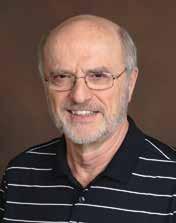
Relationships are only as deep and meaningful as the knowledge we have of one another. Vows build a guardrail around your relationship that allows for growth and discovery. Growth and change over the life of a marriage mean that we need to be in a constant state of discovery about our spouse. If we aren’t intentional in our pursuit of this knowledge, our relationship won’t have the depth we desire.
Trade-in your rules-based relationship filter for a vows-based one.
Psalm 61:8 (NLT): “Then I will sing praises to your name forever as I fulfill my vows each day.” n
Gary Moore served as associate pastor at Cloverdale Church of God for 15 years. He does couples’ coaching and leads couples’ workshops and retreats called MUM’s the Word. He has a weekly radio program – Life Point Plus – on KSPD 94.5 FM at 8:45 a.m. on Fridays. His website at www.mutualunderstanding.net has video teachings and other resources for couples. He may be contacted at glmoore113@gmail.com.
by Steve Bertel
Fill in each answer, one letter per square. Then ar range t he letters in t he highlighted squares to reveal
1. James asked, “W hat good is it, my brot hers and sisters, if someone claims to have faith but has ___ ___? Can such faith save them? ”
2. Proverbs tells us, “( T his) is more precious t han r ubies …”
3. Cyr us was t he king of ___
4. “… t he monster of the sea.”


We’ve never been taught how to “do relationship”
Gary Moore’s Mutual Under stand Method® is a straightfor ward, common sense approach that weaves scr ipture & psychological research toget her.
September 19th & 20th
Faith Journey Church 23057 Old Hw y 30 Caldwell (Friday from 7pm to 9pm Saturday 8:30am to 1:00 pm)
Itinerar

Blessings to have the time to better our communication and relationship and having Christ at the center of our marriage! Thanks for this oppor tunit y! -Rosie & Jon
By Steve Bertel
(Editor’s note: This is the first installment of a two-part article.)
In a world where hulky young men built like refrigerators purposely crash into each other along the scrimmage line many times during a four-hour period … and where anger and frustration and profanity are pretty much the norm … Mark Thornton is a voice of peace and reassurance.
As the volunteer chaplain of the Boise State University football team, many know Mark is a guiding light of sorts for those in the school’s sports program who are not only long-time followers of Jesus, but those who are also new to the faith. But few know of his dark past.
His father was a pastor. “So I basically grew up in church,” Mark said. However, there was never any indication he was going to follow in his father’s footsteps.
Because Mark had his sights set on playing football.
Graduating from high school in Sacramento and attending junior college in Monterey, he moved to Boise in 1984 and continued his education at Boise State, while his immediate family continued living in California. “I had football in my blood,” he stated. “So I came to Boise State thinking I was going to do big things as far as impacting the sports program. But, back then, I was not living for the Lord. I was living the wild life.” In fact, it wasn’t long before “I got into, well, a bit of legal trouble, and washed out. I didn’t finish my time as a player very well.”
A few years later, more legal trouble – much more – which led to him facing a possible 25-years-to-life prison sentence. At the time, he owned and managed a Boise bar, what he calls a “combination pub and deli.” One day, while dutifully overseeing the business’ routine operations, he facilitated a clandestine cocaine deal out of his back office. Little did he know, the police had used a confidential informant to set it up.
To compound his troubles, he lost two close family members only months apart. In January, 1992, his oldest sister passed away, the first in his immediate family to do so. Because of so many sad memories, “My mother didn’t want to be home for Mother’s Day. So my family – my mother, father, nieces, and nephews – all came up here to Boise,” Mark recalled. But “while my parents and family were here, I was wrestling with not only the loss of my sister, but with this felony drug charge and potential prison sentence. What’s more, I knew I couldn’t let any of my family members know what was going on because they were already grieving the death of my sister.”
On the day his family was leaving to return home to California, Mark took his father on a tour of his business, the “pub and deli.” Afterward, his father looked him straight in the eyes and said, “Son, I’m proud of you.” But it bewildered Mark. “Was he proud of me because I owned a bar? Was he proud because I owned a business? At that time, I wasn’t really tracking with what he meant. So I just let it go.” At the time, Mark didn’t understand that his father’s comments were actually a prophetic blessing. “He knew before I deserved it,” he said.
Later, as the family was driving through Winnemucca on its way back home, his father suffered a sudden heart attack and died. “So I lost my sister in January, got arrested in February, and lost my dad in May,” said Mark.
As for his pending prison sentence, Mark always felt confident he “would get out of it.” But he didn’t. He ended up reaching a plea bargain agreement with prosecutors – pleading guilty to delivery of a controlled substance – which would require he spend from three-
and-a-half to ten years behind bars. Not the best deal, but Mark knew it was far better than a life sentence.
He also knew, before he began serving his time at the Idaho State Correctional Institution (the state prison south of Boise), he would have to break the bad news to his still-grieving mother. When he finally did, “She simply told me, ‘You’ve caused me too much grief. I’m washing my hands of you,’” he recalled. “And I understood what she was saying, where she was coming from. I couldn’t have controlled my sister’s death. I couldn’t have controlled my father’s death. But I certainly could have controlled my own actions.”
He found himself alone. Locked away. In prison. With no future to speak of. But, looking back on it today, Mark realizes it was all part of God’s plan “… because, if it had not been for that prison sentence, my life would not have turned around.”
He went on to explain, “There’s a difference between believing in Christ and following Christ. The Bible says demons even believe in Christ, but it doesn’t change their behavior. So for me, I knew I had to become a follower of Christ in order for my behavior to change.”
In August, 1992, Mark experienced what he called a “Joseph moment” behind bars and, as a result, decided to really, truly, honestly become a follower of the Lord. “I had given myself to the Lord at a young age. Probably several times. I grew up in church. I knew Scripture. There was never a season in my life when I did not attend church. So, in my prison cell, I just went to God. I told him, ‘I know, in Hebrews 13:5, you said, ‘I will never leave you nor forsake you.’ So I’m asking you to please come into my heart now. For good. And never leave me.’
“I really didn’t have any plans for when I got out of prison, because my whole trajectory had been football,” he continued. “When that didn’t pan out, I became a business owner. And when that didn’t pan out, I didn’t know what I was going to do. But I knew I wasn’t going to turn back. I was determined to follow Jesus.”
So, while still incarcerated, Mark began studying the Bible more, began attending Promise Keepers meetings, and soon became the prison’s chaplain director. “I was going back to what I saw my father do, as far as ministry. So at that point, I was just going to love on the Lord, share my testimony, let people know what God had done in my life … and let Him direct my steps from there,” he said.
Mark was released from prison and placed on parole in October, 1995. “One of the teachers who would come out to the prison attended the Northview Bible Church in west Boise. So that’s where I started going; from watching his life, I knew I wanted to follow him. So I [was comfortable knowing] I had a place to worship,” he recalled. He joined Northview’s music worship team and helped in Bible study groups.
About a year later, while working in the Promise Keepers Idaho office, he began attending what is now Capital Church, on busy Fairview Avenue, between Boise and Meridian.
Then, another life-changing event. “In April of 1997, Pastor Ken Wilde came up to me and said, ‘God told me you are going to be my worship pastor.’
“But I was skeptical. I told Pastor Wilde, ‘Okay, but you don’t know me. You don’t know my story. I’m here to serve, but do you really want to put me on the platform?’”
He did. Later that month, Mark was hired as the one of the church’s worship directors. In fact, he has held several leadership positions at Capital Church over the years; he currently serves as a teaching pastor, the Men’s Ministry Director, and the church’s Community Pastor.

Continued on page 18

Continued from page 17

“So I always make myself available for the guys; I go out of my way to serve them. That’s the heart of what I do.”
- Mark Thornton
In the latter role, Mark has helped spearhead efforts to not only work with other churches in the area, but to also hold public “Worship in the Park” and “Adopt-a-Block” events. “The heartbeat of the ministry is to get out into the community, and share the gospel and the love of Jesus,” he pointed out. “We felt we didn’t need [internationally-known] Christian speakers like Greg Laurie or Luis Palau; we simply wanted to do this together and show the world what unity with Christ – and true generosity in the name of Jesus – looks like.” Mark later helped expand that outreach with the group “I Heart Treasure Valley,” branching out and bringing churches together to help serve schools, single mothers, the elderly, and even area Boys and Girls Clubs, not only serving those groups, but showing them why the volunteers were serving.
Due to those community outreach efforts, Mark eventually became the volunteer chaplain of the BSU football team. “As an alumni, BSU asked me to come and speak to the football team. So I did that a couple of times,” he said.
“It began in 2010, when Boise State played Virginia Tech in Washington, D.C.; the director of football operations called me up and said, ‘Mark, we were supposed to get the [Virginia Tech] Redskins’ chaplain to hold chapel before the game, but he became unavailable. Do you know any pastors from the Washington, D.C. area who could help us out?’
“Well, Capital Church has a national prayer center back there. I was going back there anyway to do a prayer trip and watch the game. So I told him, ‘Well, I’ll be there. I can do it, if you would like.’
“He said, ‘You would really do that for me?’
“I said ‘Sure. Why wouldn’t I?”’
So he held not only that chapel, but another one at another BSU game later that year, at the Maaco Bowl in Las Vegas – one that became personal for Mark on two levels. First, “… because I had played at BSU, and knew what it was like to finish your career unfulfilled.”
And secondly, because, “The other chaplain, who was from UNLV, gave a good ‘For-God-so-loved-the-world’ message but, to
me, issues and turmoil were still going through these young men’s hearts and minds because of their season of life. They had hopes and dreams of going to the NFL, as does any college football player. Yet, very few of them make it. And I didn’t want those guys to get so disappointed that they would go out like I went out, and perhaps go through some of the same struggles I had gone through. When I was a student at BSU, I thought my identity was being a football player; when, in reality, being a football player is an assignment, not an identity. Half the reason I got in trouble was that I was searching for love in all the wrong places.”
Prior to the bowl game, local chaplains from two groups, the Fellowship of Christian Athletes and Athletes in Action, pretty much divided BSU chaplain duties. But only for home games, since many were unavailable – or unwilling – to travel. “So they did the home games, and I made myself available for the away games,” Mark explained.
Saturday away games posed particular physical challenges. “Imagine getting home at five in the morning from a game, after standing on the field for some four hours and then traveling back home on a plane, then having to preach at a Sunday morning worship service only two hours later,” Mark said. The rigorous schedule began to wear on him. “I remember when BSU played a game in Hawaii, I misjudged the time difference. I got home at 5:30 a.m. on a Sunday. And I was scheduled to preach that morning. It was a 6 ½-hour flight, and I didn’t get any sleep. Then we did a triple-overtime game at Colorado State. The game didn’t end until 2 o’clock in the morning, and I didn’t get home until 4:30. Finally, I thought ‘Why am I putting myself through this?’”
So, after getting the go-ahead from the Capital Church leaders, Mark removed himself from the Sunday morning preaching schedule to become more available to the football team. “I’m still attending church. I’m still there as a staff person. But I’m not leading worship or preaching,” he said. “So now, my priority to the church is first, the outreach to the football team, then the outreach to the community.” And today, he feels, “It was a confirmation of: ‘You’re in the right place now, so keep doing what you’re doing.’”

In 2016, BSU asked Mark to become the team’s only chaplain, which entailed attending both the home games and traveling with the team to away games, replacing the other chaplains. “I never would have positioned myself to be the only chaplain,” he admitted. “The Lord had to work through the coaches for me to do it, because I never would have tried to do it on my own. I felt really bad for the other guys [of the Fellowship of Christian Athletes and Athletes in Action] when it happened. I felt like I was replacing them. In hindsight, though, it was God thing that I became the only chaplain, simply because it creates consistency with the players.
“The convenience for me was: I worked for a church. The church was my full-time job. So I didn’t have the pressures the other chaplains did.” Plus, being a former Bronco himself, Mark was able to connect with the student-athletes in ways the other chaplains couldn’t. “It wasn’t that they did not have a genuine love for our players. But it was easier for me to understand where these guys’ (the players’) heads were at. There’s a lot of notoriety in playing for Boise State, but it has a shelf life, so to speak. So I tell the guys, ‘Make the most of this opportunity you’ve been given.’ Like the adage says, ‘Opportunities of a lifetime must be seized in the lifetime of the opportunities.’”
Today, as the team’s sole chaplain, Mark conducts optional 30-minute chapel services, usually the evening before each game – last year, he conducted 39 services – and also-optional 60- to 90-minute Bible study sessions with the players; sometimes, even one-on-one sessions to better accommodate the players’ demanding schedules.
“People don’t understand how crazy their schedules are and how much time these guys put into strategizing, studying game films, and practicing. They spend close to 40 hours a week just with stuff pertaining to the game. That’s not to mention going to school, sleeping, or eating,” Mark pointed out. “That’s why I tell the players ‘I will bring the gospel to you. On your schedule.’ There’s the famous quote ‘People don’t care how much you know, until they know how much you care.’ So I always make myself available for the guys; I go out of my way to serve them. That’s the heart of what I do.”
As a former Bronco himself, Mark has learned to minister to the players on their own level, often pulling from his “Famous Quotes Tool Box” to help them better understand biblical teachings. For instance, if BSU is about to go up against a particularly tough team, “I use the ‘opportunities of a lifetime’ quote. The players realize they need to make the best of that game, that opportunity,” he explained. “It helps the players understand the principle – but then, I give them the spiritual applications; I point them back to the gospel and say, ‘But I’m not talking about the game. I’m talking about life. I’m talking about the opportunities you have every day to do something, to be the salt and light of the world. Are you making the best of that? You may have other moments, but you’ll never get that moment back. So make the most of that opportunity.’ … And it becomes food for thought.”
However, when Mark first accepted the role of the Broncos’ team chaplain, little did he know that position would soon lead to what he calls the greatest challenge of his life, a challenge that would put both him and Boise State University administrators in the center of a headline-making controversy.
Be sure to read all about that … and how God has miraculously worked in the school’s sports program, and in one player’s life in particular … in our upcoming November/December issue! n
Steve Bertel is a multi-award-winning professional radio, television, print media, and social media journalist, who retired after a 30-year broadcasting career. Now a busy freelance writer, he released his debut suspense novel, “Dolphins of an Unjust Sea,” available on both Amazon and Kindle. Steve and his wife of 43 years live in Meridian. He can be reached at stevebertel65@gmail.com.









By Dr. Rick Chromey
Some dates live in infamy — and some dates should. Most Americans remember September 11 as the day in 2001 when Islamic terrorists brought terror to U.S. soil, toppling the Twin Towers and striking the Pentagon. But far fewer know about another pivotal September 11, more than 300 years earlier, when Islamic expansion into Christian Europe met a decisive and dramatic defeat. It was September 11, 1683, when the city of Vienna stood on the edge of collapse. The mighty Ottoman Empire had battled its way into the heart of Europe, aiming to conquer the Holy Roman Empire and force a continent to bow to Islam.
For centuries, the Ottoman Turks had advanced steadily into Christian lands. They had conquered Constantinople on May 29, 1453, transforming the Byzantine Christian capital into Istanbul and turning the iconic Hagia Sophia into a mosque.1 The Ottomans swept through the Balkans, seized Hungary, and reached the borders of Austria.
Europe trembled. The Islamic Caliphate proved persistent and powerful. By 1683, the Ottomans under Sultan Mehmed IV were determined to strike a final, fatal blow. Mehmed IV dispatched an army of over 138,000 troops, led by the ruthless and experienced Grand Vizier Kara Mustafa Pasha.2
Their target: Vienna, Austria. At the time, Vienna was lightly defended — only 11,000 Austrian and Habsburg troops stood guard over the city. In July, the Ottomans laid siege to the town. They tunneled beneath Vienna’s massive walls and starved its citizens and defenders. After two months, the situation grew desperate. The Ottomans repeatedly called for surrender. Sultan Mehmed IV even sent an ominous threat to the Austrian Emperor Leopold I, who had fled to the west for safety: “Await us in your residence... so we can decapitate you.” 3
At approximately 5 p.m., 38,350 mounted troops — including the famed Polish Winged Hussars — descended the slopes in a thundering charge that shattered Ottoman lines. These hussars wore wooden frames with feathered wings attached to their backs. As they galloped, the wings produced a terrifying whistling roar, designed to strike fear into enemy hearts. It worked like magic on the Muslim army.
Caught off guard and overwhelmed, the Ottoman forces panicked and fled. Mustafa Pasha abandoned his command tent in hasty disgrace, leaving behind not only his war chest but also his military strategy and lofty ambitions.
Vienna was saved.

In a legendary, if not mythic story, Sobieski’s troops ransacked the Ottoman encampment and discovered a strange treasure — sacks upon sacks of dark brown beans. On each sack was scrawled the Arabic word “kafir” (or infidel).
The beans originated from Ethiopia, a country that, despite Islamic expansion in Africa, remained a citadel of Christianity. While the Islamic caliphate often showed little respect for Christian “infidels,” the beans — confiscated or stolen in various raids — had quickly become a popular stimulant among Muslim marauders. That’s why each bag was labeled as “kafir” (or infidel) beans. It served as a reminder to the Muslim troops of their origins in Christian Ethiopia. The Ottomans used coffee for energy during long campaigns. It helped them stay alert in battle, awake in prayer, and prepared for siege warfare.
But on that day, the bean changed allegiances.
But Vienna refused to surrender. The Austrians held on, waiting for help that might never come.
Help finally arrived with Jan Sobieski, King of Poland, a seasoned warrior and devout Catholic. With papal blessing and coordination of Habsburg and German princes, Sobieski led an 81,000-strong relief army — 30,000 Polish, 18,500 Austrians, and 8,000 Germans — through the Vienna woods.
On the morning of September 11, 1683, Sobieski’s forces launched a surprise attack from the high ground of the Kahlenberg hills. It proved the turning point.
After hours of intense fighting, Sobieski ordered one of the most significant and most daring cavalry charges in recorded history.
Catholic clergy initially viewed “kafir” (Anglicized as “coffee”) with suspicion, calling it “Satan’s drink” because of its Islamic roots. However, according to popular tradition, Pope Clement VIII tasted a hot cup of joe and declared: “This devil’s drink is so good, we should cheat the devil by baptizing it.”4
Whether the story is legend or fact, what is certain is that in the wake of Vienna’s deliverance, one of Sobieski’s officers — Jerzy Franciszek Kulczycki — opened Vienna’s first coffeehouse using the captured beans. The beverage quickly spread across Europe, igniting the continent’s love affair with coffee. Vienna became its unofficial European capital, and the café culture was born.
King Sobieski returned to his troops with news of total victory. He sent a letter to Pope Innocent XI, borrowing from Julius Caesar’s famous phrase: “Veni, vidi, Deus vicit,” ...or “I came, I saw, God conquered.”
Mustafa Pasha did not escape punishment. Upon learning of the humiliating defeat, Sultan Mehmed IV ordered his execution. Pasha’s head was cut off and returned to the Sultan in a velvet sack — a final sign of the Caliphate’s crushing loss.
The victory at Vienna was more than just a military triumph — it was a turning point in world history. It marked the end of the Ottoman aggression and proved the highwater mark of Islamic military expansion into the Christian West. Historians like Hilaire Belloc emphasized the significance of this event:

“Less than 100 years before the American War of Independence a Mohammedan army was threatening to overrun and destroy Christian civilization... Vienna was almost taken and only saved by the Christian army under the command of the King of Poland on a date that ought to be among the most famous in history — September 11, 1683.” 5
Indeed, in a chilling historical echo, Osama bin Laden would choose September 11 for his symbolic attack on Western civilization in 2001.
To radical Islamists, the Battle of Vienna represented a bitter memory of defeat, but to the West, it stood as a memory of unity, courage, and Divine Providence.
Today, Jan Sobieski is rightly remembered not just as a Polish hero but as the “Savior of Western Civilization.” His leadership on that September day turned the tide of history.
To this day, the bells of Vienna still ring with the memory. n
Dr. Rick Chromey is a historian and theologian who speaks and writes on matters of religion, culture, and history. He’s also a Lewis and Clark historian for American Cruise Lines (Columbia and Snake rivers). Rick and his wife Linda live in Star, Idaho. www.rickchromey.com
Sources:
1. Edward Gibbon, The History of the Decline and Fall of the Roman Empire, Volume 6 (J. B. Bury, editor, Methuen & Co., 1898 edition): pp. 150–160
2. HammerPurgstall, Joseph von. Histoire de l’Empire ottoman, vol. 13. C. A. Hartleben, Vienna/Pest, 1843. Public domain; PDF available via Internet Archive Wikipedia+7ResearchGate+7Scribd+7Scribd+7Internet Archive+7ResearchGate+7.
3. A Defiance and Indiction of War sent by Sultan Mahomet IV to Leopald, Emperour of Germany. London: Printed for A. Banks, 1683. Early English Books Online. https://quod.lib.umich.edu/e/eebo2/A51285.0001.001?view=toc
4. While Pope Clement VIII’s papal blessing of coffee did help popularize coffee across Europe, there are no contemporary 17th or 18th century document records to confirm the phrase he reportedly stated: “This devil’s drink is so good, we should cheat the devil by baptizing it.”
5. Hilaire Belloc, The Great Heresies, (London: Sheed and Ward, 1938).




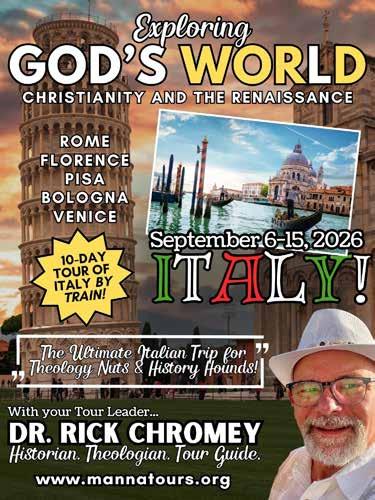
By Doug Hanson
My wife and I recently completed a seashell puzzle that was unlike any other we’d worked on.
Typically, we start by fitting together the border pieces and then building in from there. But this time, we took a different approach. The puzzle contained a few large center pieces that featured individual shells. We started by building outward from those, piecing together smaller pieces around them. Over time, we also completed the puzzle’s border so we could simultaneously build in towards the large pieces.
As we slowly worked our way through the puzzle, I found myself reflecting on the lessons it held. The puzzle reminded me of how we should approach life, including investing: from the inside-out. To invest from the inside-out means to start with the Creator and Sustainer of life, our Heavenly Father. We start by talking to God, bringing our investments before Him.
Ask God for wisdom in choosing investments: We should pray for God’s leading in choosing the companies we invest in, listening to His voice. Some companies profit from products and services which promote harmful behavior. When we invest in companies that profit from pornography, abortion, anti-family entertainment and lifestyles, alcohol, tobacco, and gambling, our profits come from the detriment of others.
In contrast, there are businesses that serve humanity in meaningful ways — those that are advancing medical breakthroughs, developing sustainable energy solutions, or providing clean water worldwide. These investments allow us to partner with companies whose products and services reflect the values of doing good. Galatians 6:10 reminds us, “As we have opportunity, let us do good to everyone.” Does God want us to invest in companies that build up others rather than tear them down?

If customers are purchasing items that degrade their lives or society, we should pray that they see the consequences of their choices and seek wisdom. On the other hand, if customers are benefiting from products that enhance their well-being, we can praise God for how our investments are helping to improve lives. Praying for customers can help ensure that the good we seek through our investments will have a lasting, positive impact.

Pray for the companies we invest in: Once we’ve prayerfully selected the companies that align with God’s values, it’s important to continue praying for them. Pray that these companies operate with integrity, that they treat their employees well, and that their products continue to bless society. Pray for the leadership, asking that they lead with wisdom, vision, and honor. In the pursuit of profits, pray that companies do not compromise their values for the sake of growth. As investors, our prayers can be a force that encourages these companies to remain true to their calling.
Pray for the customers of the companies we invest in. It’s also essential to pray for the customers who buy the products and services offered by the companies in which we invest.
“Lord, I want to be wise with the financial blessings you’ve given me. Help me invest in companies that bless others through their products and services. Encourage me to pray for those companies and their customers. And guide me in stewarding the proceeds of those investments well. Amen.”
Ask God to help us use the proceeds from our investments for His glory. When our investments yield returns, we must also seek God’s guidance on how to steward those gains. The proceeds from investments — whether through dividends, capital gains, or interest — are a blessing, but they come with responsibility. Should we reinvest them to grow our portfolio to meet future needs (Luke 14:28)? Should we use them to bless others (Acts 20:35)? Is it time to tithe on these gains, honoring God with our wealth (2 Corinthians 9:7)? Perhaps the money should be used to meet the immediate needs of our families (1 Timothy 5:8). Whatever the answer may be, we need to pray for wisdom on how to best use the fruits of our investments. The rewards of inside-out investing: As we completed our seashell puzzle, I felt a deep sense of satisfaction. The center pieces we had started with fit perfectly into the border pieces, and the puzzle slowly came together as one harmonious image. Investing with God’s guidance, starting from the inside and moving outward, is much the same. When we align our investments with God’s will, He leads us to companies and opportunities that reflect His values. Through prayer, we can ensure our investments serve His purposes and ultimately bring glory to His name. n
Doug Hanson is a financial advisor with Christian Wealth Management in Boise, Idaho, providing biblically responsible investment advice to Christians. For more information, visit investforthegloryofgod.com or contact him at doug@christianwm.com or (208) 697-3699.
Investment advisory services provided by Creative Financial Designs, Inc., a Registered Investment Advisor. Securities are offered through CFD Investments, Inc., Member FINRA & SIPC. 2704 South Goyer Road, Kokomo, IN 46902, (795) 453-9600. Christian Wealth Management LLC is not affiliated with CFD Investments, Inc. or Creative Financial Designs, Inc., a Registered Investment Advisor.

By Dr. Larry Banta
What happens if we don’t forgive? What happens if we don’t forgive and instead keep the anger and heartache inside, for years? In medical and psychiatric practice, we can see the results of this root of bitterness. For good reason Jesus often spoke of the need for forgiveness. It is fundamental in the Christian life.
We can be very thankful that He forgave us when we first came to the cross and accepted Him as our Savior. That is not the end but the beginning of a life of forgiveness. We live in a corrupt world and also have to deal with our own sinful nature.
He gave us a pattern for prayer early in His ministry, often called the Lord’s Prayer in Matthew 6:9-13: “This, then, is how you should pray: ‘Our Father in heaven, hallowed be your name, your kingdom come, your will be done, on earth as it is in heaven. Give us today our daily bread. And forgive us our debts, as we also have forgiven our debtors. And lead us not into temptation, but deliver us from the evil one.’ ”
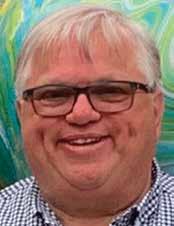
This pattern for prayer includes forgiving others as we are also forgiven. That is not as easy as it sounds. Accepting His forgiveness may not be so difficult as forgiving others or even ourselves. That is often a challenge.
Several years ago, I came across a Christian psychology book from the 1950s. It was quite interesting and maybe a bit ahead of its time. It caught my attention concerning the concept of “frozen rage” and how it affected our body and mind. The issue of unforgiveness was not studied much back then. Since then, hundreds of academic studies have taken on this issue, publishing the results in popular press as well as in scientific journals. The effect of maintaining the anger toward someone who has wronged us has profound effects on our bodies, minds and souls. Letting go, forgiving, on the other hand, has great benefits for all three areas.
What does it do to the body? There are many medical conditions that are at least contributed to by this frozen rage. Some of the effects may include: peptic ulcer disease, headaches, some chronic pain conditions, inflammation of various types, decrease of immunity to certain viruses, and even errant cancer cells we would normally fight off.
In the mind, this frozen rage may leak out and result in fits of rage or anger in situations that do not require such a reaction. Some other effects may be mood swings, depressed mood, anxiety and panic attacks.
What are the effects on the soul? Spiritually we may experience difficulty drawing close to God. Worship is not as real. We may feel we are not heard in our prayers. We may stray away from our Christian friends and family. As it eats away at our soul, we may feel anger toward God for what, as a human, we feel is some great injustice. We might start to avoid church.
Isaiah 59:2 says, “It’s your sins that have cut you off from God. Because of your sins, he has turned away and will not listen anymore” (NLT).
Hanging on to resentments, anger? We may even unconsciously decide we are going to hold on to this anger and even feed it. We keep it at the forefront of our minds. Maybe the thought of revenge drives our life and gives us purpose – but not really a good purpose. Cherishing sin in our heart always hurts ourselves.
If I had cherished sin in my heart, the Lord would not have listened; but God has surely listened and has heard my prayer.
– Psalm 66:18-19
I marvel at the situations that some are able to forgive. Some through the power of the Holy Spirit can even forgive the drunk
driver that killed their loved one, a murderer that took a close family member. I cannot see that happening on a human level.
Having been involved in orphan care over the years, I have seen God work in wonderful ways. One such situation was a sibling group of six girls. When I met them, they ranged from about 6 to 15 years of age and had been living in the orphanage for a few years. They had a history of sexual abuse; and then one day, returning from the park, they found their mother had committed suicide. Their frozen rage was leaking out in all kinds of behaviors. They were accusing others of things that were not happening, fighting with other girls, disobeying, talking back. Family group therapy was initiated to address the behaviors. The older sister was clearly in charge and had instructed the younger ones to never speak about the trauma in their lives.
Perceiving her own frozen rage due to her past trauma, the older sister finally was able to allow all of them to express their own emotions. Their anger and grief came flooding out as they spoke of the trauma. Though resolution took some time, this was a major breakthrough. During the next several years, I saw them gradually one by one come to Jesus and forgive their mom for what she did to them. They were able to grow into well-adjusted adults.
Okay, so now how do we forgive? It starts with a heart right with God.
1. Humble yourselves before God. (James 4:7-8)
2. Confess your unforgiveness before Him. Confession means agreeing with God that you have sinned. (1 John 1:9)
3. Ask God for the power to forgive those who have done something against you.
4. If possible, seek out the one you are forgiving and offer them the gift of forgiveness. The reactions are not always positive, but you have done your part.
5. If you have wronged someone and need to be forgiven, seek them out and ask for forgiveness from them, if possible. This can be difficult, but it could result in restoration of an important relationship.
6. Sometimes we may need to forgive ourselves. Anger toward ourselves can come from our past behavior. How do we forgive ourselves? It is a process of letting go of pride. In humbling ourselves we can see that we may have had the mistaken idea we know better than God. He forgave us, now we need to accept that and start the healing. Maintaining the self-loathing results in shame and guilt and provides an open door for Satan and an excuse to return to the addiction/sin.
1 John 3:19-20 reads, “This is how we know that we belong to the truth and how we set our hearts at rest in his presence: If our hearts condemn us, we know that God is greater than our hearts, and he knows everything.”
God is greater than our hearts. We take the place of God when we decide not to forgive ourselves and allow His healing to overcome us and change us.
If you are struggling in these areas there may be need for professional counseling to help.
How is your heart today? Are you holding a grudge or anger toward someone, toward yourself? Maybe it is time to give it over to God and allow His healing in your body, mind, and soul. n
Dr. Larry Banta is an author of several books, a retired psychiatrist, and a former missionary. He served in India, Mexico and Kenya. He and his wife, Evelyn, a counselor, travel together to provide consultation and training in various international locations.
By Gaye Bunderson
Millions of Americans take to the road each year in their recreational vehicles, or RVs. They do it for kicks, sightseeing, and freedom from the daily routine. After all, that’s why the vehicles are called “recreational.” But there’s another group of RV travelers who are called SOWERs, and they travel for service. But make no mistake – there’s plenty of fun and fellowship involved as well.
SOWERs stands for Servants On Wheels Ever Ready, and the full name for the group is The SOWER Ministry. In the ‘70s and ‘80s, ministry founders Frank and Kathy Varga would travel the highways of America and offer assistance to other trav elers. It occurred to them that groups of specifically Christian Revers were needed across the country to give of their time, talents, and faith to help the many Christian ministries across the land. The SOWER Ministry was incorporated on August 10, 1984.

with the ministry for three years. The senior couple has now been on staff at Hope House on a permanent basis for five years. Carina stated their permanency at the non-profit started with God. “He said, ‘Move’,” Carina explained. And they did, making their home in the Treasure Valley and being actively involved in the goings-on at Hope House.
The Jumps have been married 42 years, and during their RV traveling days ventured to Oklahoma, Arizona, and Alaska. But, Carina declared, “Hope House is the love of our life.”
The Hope House structure, which was originally built in the late ‘70s and early ‘80s, had been condemned. When George showed up, he brought with him skills in carpentry – experience he wanted to put to use helping renovate and rebuild the Hope House structure.
Since then, many RVers have traveled through the country offering help to such faith-based organizations as Christian camps, rescue missions, group homes, and even Christian schools and colleges. A couples group, the works they perform include, for the men, constructing new buildings and renovating-repairing older ones; for the women, repairing worn blankets and clothing, sewing curtains and aprons as well as presenting craft projects and doing work in the kitchen; and putting a fresh coat of paint on exterior and interior surfaces frequently includes both men and women.
An area non-profit benefitting annually from SOWERs’ faithfulness and work ethic is Hope House, a home for children who are emotionally impaired, developmentally disabled, or who come from disrupted adoptions or dysfunctional families; it is located four miles south of Marsing. Since Hope House connected with The SOWER Ministry, many acts of service have been performed by the generally older and retired volunteers.
George and Carina Jump started with SOWERs in 2004 and traveled


Using a construction metaphor, Carina said, “God has a way of hitting you in the shins with a 2x4” when He wants believers’ attention to indicate what He has in mind for them. Hope House needed essential repairs to stay in operation, and George arrived on-scene with the skills to provide them.
Hope House’s original founder, Donna Velvick-Lowry, said to the Jumps all those years back: “Our prayers have been answered!”
Sure enough, George brought the building up to functional and safe standards again, and Hope House continues going strong in 2025.
More SOWERs have shown up over the intervening years, driving into the lot in their varieties of RVs. They may all show up in recreational vehicles, but their strongest common attribute is their faith. The application process for becoming a SOWER involves a written application that includes a testimony, a letter of recommendation from a pastor, a back ground check, and a personal interview.










By Mark Naito
In a world where most things are connected through technology at some level, how can this possibly affect my marriage? Shouldn’t this help? With all the free tools, resources, and even biblical resources, my marriage should be stronger, right?
On the surface it seems like the obvious answer is, “Technology is helping my marriage.” I often hear people say, “Tech only affects kids” or “I have a good balance with technology” or “I rarely use it anyway.” But often, statistics show otherwise.
Look at this study from https://www.statista.com/statistics/266587/ percentage-of-internet-users-by-age-groups-in-the-us/ It is not always the content being consumed that is bad but that we get way too much of it that really is not necessary. We were not created by God to consume so much information. Scripture tells us to “be still and know that I am God.”

But how can we do this in our marriage when we are going to technology first? Examples: Watching TV together or separate, checking smartphone periodically for email/ weather/kids’ communication, tablet to catch up on a podcast/series/ messages, etc.
And keep in mind that from the very beginning, a huge target has been placed on our marriages, starting with Adam and Eve. In Genesis 1:27-31 in The Message Bible, it reads: “God created human beings; he created them godlike, reflecting God’s nature. He created them male and female. God blessed them: ‘Prosper! Reproduce! Fill Earth! Take charge! Be responsible for fish in the sea and birds in the air, for every living thing that moves on the face of Earth.’ Then God said, ‘I’ve given you every sort of seed-bearing plant on Earth and every kind of fruit-bearing tree, given them to you for food. To all animals and all birds, everything that moves and breathes, I give whatever grows out of the ground for food.’ And there it was. God looked over everything he had made; it was so good, so very good! It was evening, it was morning — Day Six.”
In the beginning, things were good, but then sin entered. In Genesis 3, from The Message: “The serpent was clever, more clever than any wild animal God had made. God told the serpent: ‘Because you’ve done this [convinced Eve to eat from the Tree of Knowledge of Good and Evil], you’re cursed, cursed beyond all cattle and wild animals, cursed to slink on your belly and eat dirt all your life. I’m declaring war between you and the woman, between your offspring and hers. He’ll wound your head, you’ll wound his heel.’ He told the woman: ‘I’ll multiply your pains in childbirth; you’ll give birth to your babies in pain. You’ll want to please your husband, but he’ll lord it over you’.”
After what Satan did, he was cursed in a very harsh way. You know this made him really angry beyond any reasoning. So since then, our marriages have been under severe attack. And then you have God saying He has declared war between the woman and man. Also, between the offspring/kids.
Technology is the new Tree of Knowledge that offers the lures of freedom, love, and other things we long for but can only find in God. I’m not saying literally it is this, but it has similar traits, and Satan is using it to get back at us for his curse. “God told the serpent:
‘Because you’ve done this, you’re cursed, cursed beyond all cattle and wild animals, cursed to slink on your belly and eat dirt all your life’.” Do not think for one moment that Satan has forgotten. Even though our Tree of Knowledge and Tree of Life are not as obvious, they can be more subtle and culturally accepted, making the choice of choosing “life” or “death” in our marriages harder.
Someone from a camp designed to help keep kids safe online said to me, “With technology for my husband and I, we are fine. In fact, my husband only has a few social media accounts and I do not think he even checks it all that much. I think.” But this conversation was a great starter for her to realize that the concern with tech not only lies with kids but also with adults.
During my recent business/family trip to the Ark Encounter in Kentucky, one takeaway was that prior to sin, everything was perfect and without sin or destruction. But after Satan came in and tempted the first married couple to sin, everything is now cursed and will be until Jesus comes back to restore the Earth to the way God intended. And with technology, messages more often are “rumors” which spread six times faster than real news, according to the documentary The Social Dilemma.
How does this apply to my marriage? Below are excerpts from an article at https://www.marriage.com/advice/divorce/reasons-technology-is-affecting-divorce-rates/. Some key things that the article says can cause divorce or lead to dissatisfaction in a marriage include, by topic:
I think it is safe to say we all understand that social media has become a part of our everyday life at some level. According to this article, “A study posted in the journal Computers in Human Behavior (http://www.sciencedirect.com/science/article/pii/ S0747563214001563) done by researchers at the University of Boston and Pontificia Universidad Católica de Chile studied stateby-state divorce rates to per-capita Facebook accounts and found a direct correlation between social media use and decreased marital quality. It’s only time [until] social media and divorce statistics start to show some correlation too. The amount of social media use in a marriage can lead to jealousy and often cause major communication issues. Social media causes divorce if the time spent on it is not monitored. It’s surprising that it is one of the top reasons for divorce in America.”
We work on technology — anything with a screen — throughout the day in most of our jobs and even in ministry. Then we come home to do more of this and neglect one of the most important things in our lives: our spouse. The article stated, “A Nielsen Co. audience report indicates that adults spend an average of 10 hours and 39 minutes a day on the computer. This leaves just about enough time to drive home and take a shower. As a result, couples are losing valuable communication time that has several long-term consequences.”
Our everyday life has gone from talking to people about things to communicating it through some technology medium. According to the article, “Today, many people go out not to socialize, but to share their ‘social experience’. Today, consumers want experiences that they can share with their friends on social media and sometimes they forget to share these moments with their spouses.” Instead of sharing details of each other’s day, there is a tendency to share it with others first or with a text message. We have lost the simplicity of picking up the phone and calling or making time to talk in person.
More information from the article includes: “According to USA Today and Business Insider, adults spend an average of 23 hours a week texting. A survey led by qualitative social researcher Ruth Rettie concluded that texting is a complementary medium for many couples and has become a primary way of communicating with your spouse. However, research indicates that texting gives us a ‘remote social connection’ that differs from the intimacy present in phone calls. The study found that ‘texters’ were more likely to feel lonely than ‘talkers’. As a result, this can cause a distorted connection between couples. One important form of this ‘intimacy’ has a lot to do with the tone of voice and the duration of the conversation.
“Maslow believed that it is important that our lives be filled with happiness and contentment. If we strive for growth and strength, happiness and satisfaction should come naturally. If you focus on freeing yourself (even a little) from the chains of technology, you might see stronger growth in the communication between you and your spouse.”
The excerpts from the article all go back to what we know in the “intentional tech space” of people having a distorted understanding of connection. In the end, it is always a best practice to try to do inperson interactions.
As a local expert in this space, I do local research at places like Panera, McDonald’s or other sites. What I see with couples, ranging from young to old, is that the older couples tend to be more on their screens/devices. Interesting, right? But in all cases, couples are not communicating directly without having some time on their screens at some point.
So how can we be more intentional in our marriages?
As my Christian counselor encouraged me from the very beginning of our sessions, read and pray together every day. What my wife and I do personally is have individual time with the Lord in the morning and then come together to do a Christian topic study. Then we eat breakfast and share what we have going for the day to sync and end with prayer. Later in the evening we do a Bible study together, going through different books of the Bible. Keeping in mind that the key is not getting through the study or passage of Scripture but allowing the Holy Spirit to work within the time frame we have. Sometimes we do not even get past a couple of sentences and that is okay.
Did this happen overnight for us? No. It did take time; but by being intentional with our technology, it helped us to really lean into the Holy Spirit’s leading and work through things together.
The other thing that has been helpful from our biblical counseling and time together is to stay away from any resource except the physical Bible(s) — specifically when we are spending time with the Lord alone and not a topic study. Then the Holy Spirit can work. Other Christian influences are okay and good at times, but what we have found is that there is nothing like a good physical Bible and paper journal to invest in our relationship with Abba Father and each other. And writing dates and notes of what we discussed is a legacy we leave behind for our kids that no database can ever take away. You truly are building a bond together in unity without outside influences.
A tech tip is if it is “free,” there is always a cost. And even though the content is good, it will often consume you more than spending quality time with a family member, friend or, in this case, your spouse. My wife and I have been pleasantly surprised by how we are more intentional with those around us simply because we have no other option.
Also, when you are out with your spouse, try to leave your screens or smartphones in the car if you go into a restaurant or shopping. If for some reason you need your device for medical or other reasons, check with your healthcare provider and ask for alternative ways you can go without your device for a period. This would be a good practice anyway if the power or internet goes out. There is always an alternative — not always convenient but possible.
Your end goal is to work on your “Hierarchy of Communication.”
See below:
Digital communication and ‘connection’ sometimes feel magical, but often come at the cost of our very humanity. The Reset Tech Kit Helps Move People Up The Relational Hierarchy of Communication. Face to face conversations are better than verbal calls, which are better than a written letter, which is better than a social media message. What barriers or distractions can you set aside today to nurture your relationships?

Continued on page 29

By Roxanne Drury
I watched a robin this morning as she searched the tall, wet grass for a morning meal. The sprinklers had been on and had very probably coaxed the little robin’s breakfast near the surface. She hopped here and there, then suddenly stopped, cocked her head, and with a swift jabbing motion, dove her beak into the ground and with two hard, fast tugs pulled out a fat worm that looked to be about five or six inches long. If birds could talk, I am reasonably certain she would have shouted what I did as an observer: “SCORE!” (I really did shout SCORE!, I was so excited for her!)
She finished her first course and hopped to another section of the lush green lawn and promptly found the second course to her meal. I watched her for quite some time repeat her search-and-find mission, and then she happily flew off, content and satisfied that she had relieved our yard of all the fattest and juiciest worms. But was she done? Had she met her fill? Nope! She flew to the neighbor’s yard and began her search all over again. I found this whole scenario quite fascinating.
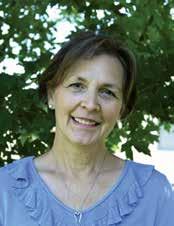
As always, when I see something that amazes me, I try to find a way to see God in it. This morning it was easy. Oh, I could quote the likely Scripture here found in Matthew 6:26 – “Look at the birds of the air; they do not sow or reap or store away in barns, and yet your heavenly Father feeds them. Are you not much more valuable than they?” The lesson being: God takes care of the birds, He’ll take care of you. But I’d like to go much deeper today. Let’s think about our souls rather than our bellies, as the soul is the heart of each one of us.
My little friend, the robin, kept searching, kept filling herself with bugs and worms. (Ewwww!) She needs to keep filling herself. It is a matter of survival and perhaps being able to feed her young. I have to ask, what do we keep filling ourselves with? What feeds the very heart of you – your soul? What do you think you need to make you whole –to survive?
We often search for people we think will fill us up. Perhaps for you, it is traveling, a lovely house, a boat, a motorcycle, a better job, or more money – the list can go on forever. We could continue searching tirelessly, but we still won’t find what we need. My little robin was not always successful in her foraging. Sometimes she’d drive her beak into the ground and come up empty-beaked. She hadn’t looked in the right place. We are the

same. We can look and buy and go and do, but we won’t find what we need until we look in the right place: UP!
God made us so we could and would have a relationship with Him. He made us in such a way that our souls long for Him. He is what we need for survival. He is the one who makes us whole.
“O God, you are my God, earnestly I seek you; my soul thirsts for you, my body longs for you, in a dry and weary land where there is no water” (Psalm 63:1).
“My soul yearns, even faints, for the courts of the Lord; my heart and my flesh cry out for the living God” (Psalm 84:2).
I have Psalm 62:1-2 labeled in my Bible as “My Song”:
“My soul finds rest in God alone; my salvation comes from Him. He alone is my rock and my salvation; He is my fortress, I will never be shaken.”
God made each one of us so that He could be with us; so we could be filled up with Him. He even sent His Son, Jesus – Emmanuel, which means ‘God with us’ – so we could be with Him eternally. When my soul is filled up with God, none of the other things matter, because it is all about God. I have inner peace. I am content. I am satisfied. I am whole. I have looked in the right place and found what my soul needs: God with me!
Here’s an idea. What if the very first thing we (you and I) do upon waking up – before even slipping out of bed – is ask God to walk with us through the new day? Inviting Him to simply be with us makes us more aware of His constant presence. Ask what God’s plan is for you this day. Maybe even ask if we can see Him in all the things that this day holds.

If we did that every single morning and truly meant it, I imagine that each morning God would smile really big and say, “I’d like nothing more, my child.”
SCORE!
“Find rest, O my soul, in God alone; my hope comes from Him” (Psalm 62:5). n
Roxanne Drury is a wife, mother, grandmother, and retired Christian preschool teacher who served the Lord in children’s ministry for over 45 years. She has written a group study guide on Psalm 23, as well as other books. She may be reached at glorylandbooks@gmail.com.





Continued from page 27
As my previous article stated, give this a try for a month and see how your relationship with your spouse goes. Again, it will not always make things “rosy,” but you will find yourselves connecting more and really working through things in a real way — ultimately enhancing your relationship with God. If you find there is a lot more than what you can handle, I would encourage you to reach out to a good Christian counselor who leads with faith first and then traditional counseling methods second. One great resource is Grace Center.
The best part of all of this? God is the same yesterday, today and forever. He never changes and is always relevant in any period. Think of the Noah’s Ark Encounter in Kentucky, a real-life replica and one of the largest wood structures in the world. You will see first-hand how God’s ways are not ours and we do not need society’s ways to enhance or keep our marriages sacred and fulfilling. God even thought of ways to get fresh air and water for the entire boat. And the boat is nearly two football fields in length and almost seven stories high! There is much more that would really help you understand that His ways go beyond even the most technologically advanced thing we know today. His technology is truly the most innovative — and this is coming from a business marketing professional who has seen a lot of great technological advances, but Noah’s Ark trumps them all.

And avoid any screens throughout the evening or through the morning until you leave or start work. This gives your spouse and you an opportunity to get creative with your time together. Like our Reset Tech Kits for the family, you will find yourself bored and seeking alternative things to do. Things like going for a walk together, picking up an activity together, joining a life or Bible study group, doing family activities together, etc. I encourage you to give yourselves the liberty to get creative. Make it fun! And if you have trouble with implementing this, please feel free to reach out for more ideas. Also, invest in other things like the Weekend to Remember by Family Life.
Please reach out to us and share your story. We love hearing how God is moving in your lives. And always know you are not alone in fighting the good fight. My wife and I are living testimony that the battle is real but God is able if you get rid of what easily ensnares your marriage. We pray blessings upon your relationship. n
I encourage you to take up this challenge with your spouse: commitment to God and each other. Take a break from technology for one month. What does this look like? At a minimum, put your smartphones in a visible area but away from where you spend most of your time when you get home from work or are done for the day.


Mark Naito is passionate about helping people by seeking ‘root cause’, providing result-oriented solutions and good outcomes. His passion has always been to empower others to be educated to make their own informed decisions on what makes sense for themselves or their families. He started Navigating Tech Family toward that goal. He is a family man with a beautiful wife and kids and loves doing life with his family in the outdoors. He may be reached at mark@navtechfam.com.








By Matt Sieger
When our three children were growing up, our son Paul wanted a Boston Terrier. So I went online and found a shelter in Fresno, Calif. about a three-hour drive from our home in the San Francisco Bay Area, which had what they said was a Boston Terrier.
I was able to reserve the adoption with a $50 deposit. Paul and I then drove to the shelter and met Mugsy. To our great surprise, although he looked like a Boston Terrier, he was about three times the size. But we loved him right away and took him home.
When we stepped through the front door, the first thing my wife said was, “Wow! That’s a big Boston Terrier!” He promptly ran out into the backyard, scaled our fence, and landed on the corrugated roof of our neighbor’s shed. He could jump!
My son named him Mugsy, after Mugsy Bogues, the diminutive NBA basketball player who could jump a mile.
We did a bit of research and discovered that Mugsy was actually an Olde Boston Bulldogge. Helen Keller had one. Sometime in the early part of the twentieth century, the Olde Boston was bred down in size to the more manageable Boston Terrier.
We loved Mugsy. Like most Bostons, he was not terribly trainable, although he did somehow get his dog obedience diploma. He was very good at escaping out the front door. When he did, we would call after him. He would turn his head to look at us, then decide, “Nope, I’m just going to keep on going.”
One day he did that and ran up the block with me in hot pursuit. A young couple had just pulled into their driveway and the wife opened the passenger door, whereupon Mugsy jumped onto her lap. She was a good sport about it and, Mugsy, I should add, would never hurt a fly. If a burglar ever entered our home when we were away, I’m sure Mugsy would have shown him around the house.
One day when the kids were at school and my wife and I were at work, I got a phone call. A woman told me that Mugsy was loose on the street and chasing a bunch of kids on bicycles. We recovered our dog and brought him home, where we discovered our front window was broken. Mugsy had jumped up onto our reclining chair, which was next to the living room window. Apparently he rocked back and forth until the chair crashed through the window and he made his escape.
Every day I came home from work and opened the front door, Mugsy was there to greet me with his Frisbee in his mouth, expecting me to go to the backyard to throw it around for him.
A sad time came when Mugsy, just seven years old, began to slow down and nestle next to me more than usual for comfort. Paul took him to the vet and learned that cancer had spread throughout Mugsy’s body. So Paul agreed to have our beloved pet put down. He was cremated and the vet had his ashes put in a special urn with Mugsy’s name. I went to the vet to get the urn, and as I stepped into my car, I was overcome with emotion and burst into tears.
As I drove out of the parking lot onto the street, what should I see on the sidewalk but a man walking a dog who was the spitting image of Mugsy! Same coloring, same size, jumping up with joy at his master’s side.
I must point out that there are not many Olde Boston Bulldogges around, let alone one happening to appear right after my moment of grief. Whether I was seeing an angelic dog and angel owner, or experiencing a great earthly coincidence, I believe that God was showing me that when I pass, I will be reunited with Mugsy in heaven.
If you think that’s nuts, I’m in good company.
Martin Luther said, “In Paradise there was complete harmony between man and animals; one day again that harmony will be restored and all creation will be made anew.”
Billy Graham put it this way: “I think God will have prepared everything for our perfect happiness. If it takes my dog being there (in Heaven), I believe he’ll be there.”
For a deeper theological take, here’s C.S. Lewis: “The theory I am suggesting . . . makes God the centre of the universe and man the

subordinate centre of terrestrial nature: the beasts are not co-ordinate with man, but subordinate to him, and their destiny is through and through related to his. And the derivative immortality suggested for them is not a mere amende or compensation: It is part and parcel of the new heaven and new earth, organically related to the whole suffering process of the world’s fall and redemption.”
So get that Frisbee ready for me, Mugsy! n
Matt Sieger, now retired, is a former sportswriter/columnist for New York and California newspapers. He has a B.A. from Cornell University and an M.A. in magazine journalism from Syracuse University’s Newhouse School of Public Communications. He is the author of “The God Squad: The Born-Again San Francisco Giants.”

Continued from page 25
John and Becky Ballard are from Pahrump in southern Nevada. John has done carpentry work, trade work, landscaping, yardscaping, weeding – and lots of painting. “Both men and women do a lot of painting,” Becky said. The Ballards have been to 12 sites since they started in SOWERs in 2021. Recently, after working in Marsing, they were heading to South Dakota and Montana. Said Becky: “We’ve met many wonderful people and we want others to know that Christianity is alive and well in this country. Christians are helping many children, and others.”
Wade and Anne Little from California referred to themselves as “primarily West Coast SOWERs”. They’ve been involved for four years and early this summer were helping Hope House’s school program – called Hope Christian Academy and situated on the Hope House Marsing campus – get ready for the academic year by covering the academy building with coats of paint, doing caulking, making repairs where needed, and performing general cleaning tasks as part of a SOWERs team.
Wade explained there is a group leader on each team, and those individuals have to have been on two mission trips to qualify for the group leader position.
He also explained, “We bring our own tools and have different skill levels. We are required to take a skill survey [before being accepted].”
SOWERs participate in a devotion at 7:30 a.m. workdays and pray for one another.
“Motorhome people generally serve themselves through the experience of traveling; SOWERs is a way to serve others using your motorhome – and you meet new friends,” Wade stated.
Ron and Debbe Mead heard about SOWERs years back but just became members as a couple a little over two years ago. “We are newlyweds doing the Lord’s work,” Ron said. They are from Jumal, Calif. and winter in Yuma, Ariz.
The work they have performed at various Christian sites across the U.S. include farming, animal care, and gardening. Ron jokes that they live “in the Garden of Eatin’.”


Debbe said they’ve “cut a lot of roses”, and Ron performed maintenance work.
“Being in SOWERs gives a purpose to your RV lifestyle,” Ron said.
Wade praised Ron as “legendary – he’s a 28-year military veteran, a jack of all trades, and was a firefighter.” Debbe was a special needs educator during her career, but said that’s not the kind of work she does now at Hope House. “We’re there to serve the staff; we’re there to help them with the things they don’t have time to do.”
Wade chimed in that, as volunteer SOWERs, “The bigger way we can help the students is to pray for them.”
And they definitely do.
The Meads also took a moment to explain the experience isn’t all work. “We have game night, sightseeing, and fellowship.” SOWERs are given time off each week to get to know the people and recreational opportunities that surround the sites where they are serving and camping in their RVs.
The SOWERs only stay in one place for three weeks. They then may return home or travel on to another site.
How valuable are SOWERs to the ministries they serve? Denae Warren, now the top executive at Destination Caldwell, said this about the RV travelers: “As a Hope House alumna and now board member, I’ve seen firsthand how the SOWERs embody love in action. Their willingness to show up – tools in hand and hearts wide open – has transformed not just campus buildings and property, but lives. Year after year, their volunteer work saves Hope House thousands of dollars in labor costs, allowing more resources to go directly to the kids. Their service is a powerful reminder that hope is something we build together.”
The SOWER Ministry is based in Texas. SOWERs hold rallies –usually in Texas – with classes to prepare them for service and with a chance for newer volunteers to meet and learn from the experienced ones.
For organizations who might need the SOWERs or for God’s faithful who would like to do more with their RVs than just tool down the road and burn a lot of gas, this could be just the thing. Go to sowerministry. org for more information. n














